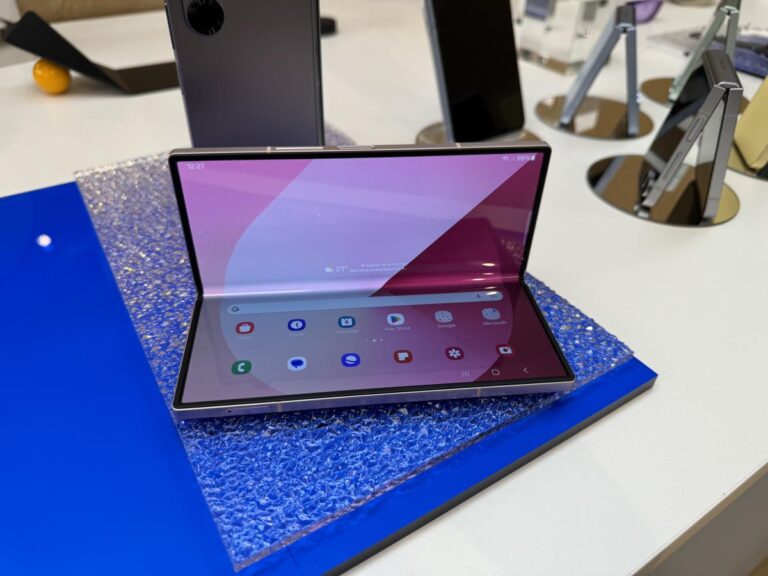Samsung unveiled a slew of new devices at its Unpacked event in Paris, France on Wednesday. Not only did the company show off its latest foldable smartphones, the Android-powered (GOOG, GOOGL) Z Fold 6 and Z Flip 6, and its next-generation smartwatches, the Galaxy Watch 7 and Galaxy Watch Ultra, it also unveiled the highly-anticipated Galaxy Ring.
But the star of the show was the company’s Galaxy AI platform. A suite of software products that the company first unveiled earlier this year alongside its Galaxy S24 smartphone series, Galaxy AI includes a host of generative AI features that touch on everything from Samsung’s health and fitness apps to its photo, productivity and web browser services.
The strategy is clear: Samsung is banking on its own AI efforts, including some Google AI magic, to help drive future device sales. But its longtime rival, Apple (AAPL), is months away from releasing its own AI software that could sway Samsung users over to the iPhone.
The AI era
Samsung’s latest devices are certainly impressive — I’m a fan of both its foldables and its smartwatches, which are some of the most capable out there. The addition of the Galaxy Ring could help Samsung gain a firmer foothold in what is still a relatively small market, but the company is clearly committed to pushing AI capabilities to the fore with each new product.
Samsung demonstrated how Galaxy AI fits into the Galaxy Ring, Watch 7, and Watch Ultra with the addition of the company’s new Energy Score feature. The company said the software uses Galaxy AI to calculate things like the quality of your sleep and how much exercise you’ve been doing recently to give you a numerical value for your overall fitness level, which can help you better understand why you feel tired or energized on a given day.
Also shown off was a Conversation Mode feature that turns the Fold and Flip’s cover and main screen into a digital whiteboard that displays what you and your interlocutor are saying in your native language, allowing you to converse with people who speak different languages. The app can also read the translated text aloud.
Samsung has similarly introduced generative AI features to its Photos app, allowing it to draw sunglasses on people in an image or automatically generate and place lifelike glasses on a subject’s face. Samsung also uses some of Google’s AI capabilities, adding the company’s Gemini software and assistant to its devices.
Stay and upgrade incentives
Like Apple, which announced its generative AI initiative “Apple Intelligence” at its WWDC event in June, Samsung is using AI as a way to differentiate its latest hardware products from older devices, and hopes that the Galaxy AI and its features will entice customers who have stuck with their smartphones for more than two years to purchase newer, more expensive options.
Unlike Apple, which is only making its AI options available on the iPhone 15 Pro and future smartphones, Samsung plans to roll out its Galaxy AI software to several previous-generation products, including the S22, Z Fold, and Flip 4 series from 2022, and the S23, Z Fold, and Z Flip 5 series from 2023.
This makes sense as consumers tend to keep their phones for two to three years, allowing users to experience Galaxy AI when they’re ready to upgrade, incentivizing them to stick with Samsung and continue to take advantage of the company’s generative AI capabilities.
The South Korean tech giant reports that customers are already using its AI software at a rapid pace, with 77% of S24 owners accessing the AI features weekly, and with Samsung hinting that it may start charging for AI services in the future, the Galaxy AI service could not only help keep customers loyal to the company and motivate them to upgrade to its latest smartphones, but also open up new revenue streams.
Of course, that may also depend on what Apple ultimately decides to do with Apple Intelligence Services: If Samsung charges for its AI software and Apple makes it free, that could motivate customers to switch to the iPhone.
Either way, the two companies are entering a new race to see who can surpass the other in generative AI know-how. Samsung has a significant lead in bringing its software to market, while Apple is just months away from launching its own AI platform. Time will tell if either AI service is capable enough to drive sales.
Contact Daniel Howley at dhowley@yahoofinance.com. Follow him on Twitter. Daniel Howley.
Click here for the latest technology news impacting the stock market.
Read the latest financial and business news from Yahoo Finance


